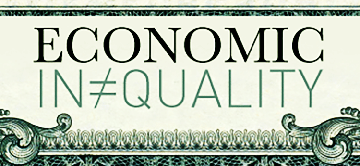The Primacy of Shareholder Value and the Rise in Economic Inequality
By Michael Musuraca

The data continues to arrive from sources far and wide confirming that the growth in economic inequality continues unabated throughout the world, including a handy map of the United States by the Economic Policy Institute (EPI) released just this past week that shows the level of inequality by state, metropolitan area, and county.[1]
The rise in economic inequality, a problem that former US President Barack Obama identified as “the defining issue of our time” has implications that investors need to factor into their investment decisions, including their own role in stoking market forces that contribute to the rise in inequality, and the attendant implications for human rights abuses by the business entities they invest in.[2] The Investor Alliance for Human Rights (IAHR) was created to provide a common platform for investors to collaborate on how best to address human rights abuses in their investments in order to achieve significant impact on reducing such abuses. As a first step, this blog seeks to explore how the focus on maximizing shareholder value has contributed to the rise in economic inequality and the prevalence of human rights abuses in the business world.
There are several reasons that investors need to concern themselves with the rise in economic inequality. As a paper prepared for the Principles for Responsible Investment (PRI) by David Wood noted, the rise in economic inequality can: 1) negatively impact long-term performance of investment portfolios; 2) change the risks and opportunities that affect the universe of potential investments; and 3) lead to a destabilization of the financial and political systems upon which investors and the global economy rely.[3] Recent events, from Brexit to the election of Donald Trump and the rise a resurgent nationalism throughout the world, reinforce the notion that the very foundations of the social order are jeopardized by the rise in economic inequality, and whether or not an individual investor holds that globalization, technological change, or other factors account for increased economic inequality, the stark reality is that the economic inequality is having a profound impact around the globe.
For investors, a first step to take to address the rise of economic inequality in their investment decisions might well be to ascertain what role investors played in contributing to the rise in economic inequality that exists today. Most all investors are familiar with the famous quote from Milton Friedman on the role of the corporation, “…a corporation’s responsibility is to make as much money for the stockholders as possible.”[4] How many investors would say that they agree with Friedman in 2018 is an open question, but to the degree that investors continue to demand that maximizing shareholder value is their primary goal they are telling corporate managers to behave in ways that Friedman would find very comforting. What this means for how workers fare in the global economy (whether in the developed or developing world), how the world begins to fully address the perils to life from climate change, or how women and racial and ethnic minorities are to achieve full inclusion in the political, economic, and social order are bound up, in large part, on how investors think about their role as well as that of the business entities they invest in.
[1] See EPI, Estelle Sommeilllier and Mark Price “The New Gilded Age,” EPI Download, July 19, 2018.
[2] Greg Sarget, “Inequality is the ‘defining issue of our time’,” Washington Post, December 4, 2013.
[3] David Wood, “Discussion Paper: Why and How Might Investors Respond to Economic Inequality,” PRI and the Harvard Responsible Investment Institute, November 2016.
[4] Milton Friedman, Capitalism and Freedom (University of Chicago Press, 40th Edition, 2002).